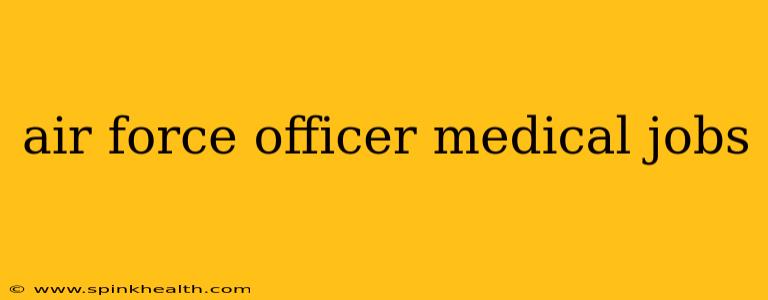The crisp blue uniform, the unwavering dedication, the chance to serve your country while pursuing a passion for medicine – these are just some of the compelling aspects of a career as an Air Force officer in a medical role. It's a journey that blends the thrill of military service with the profound satisfaction of healing and caring for others. But what exactly does this path entail? What are the different specialties? And what does the training process look like? Let's dive in.
My name is Captain Eva Rostova, and for the past five years, I've served as a flight surgeon in the United States Air Force. My experiences have been both challenging and incredibly rewarding, shaping my perspective on what makes a career in Air Force medical officer roles so unique. I'm here to share my insights and answer some of your burning questions.
What are the different types of Air Force medical officer jobs?
The Air Force offers a wide array of medical specialties for officers, ensuring there's a place for almost every medical professional. This isn't just about doctors; it encompasses a vast network of healthcare professionals dedicated to keeping our Airmen healthy and mission-ready. Some of the most common include:
- Physicians: From family medicine and internal medicine to more specialized areas like cardiology, psychiatry, and emergency medicine, physician opportunities are diverse and abundant.
- Dentists: Maintaining the oral health of Airmen is critical, leading to a strong demand for dentists across various bases.
- Medical Corps Officers: This encompasses a wide range of healthcare providers, including nurses, physician assistants, and other allied health professionals. The specific roles available within this category depend on the individual’s qualifications.
- Registered Nurses (RNs): Providing crucial patient care in various settings, from hospitals to clinics to deployed locations.
- Physician Assistants (PAs): Collaborating with physicians to provide comprehensive medical care.
The specific roles available are constantly evolving to reflect the needs of the Air Force. It's always a good idea to check the official Air Force website for the most up-to-date listing of available specialties.
What is the process of becoming an Air Force medical officer?
The path to becoming an Air Force medical officer is rigorous but rewarding. It generally involves these key steps:
- Obtain a Medical Degree: You'll need to complete medical school and obtain a Doctor of Medicine (MD) or Doctor of Osteopathic Medicine (DO) degree.
- Complete Residency: After medical school, you'll undertake a residency program in your chosen specialty. This provides crucial hands-on training and experience.
- Apply for an Air Force Commission: Once you've completed your residency, you can apply for a commission as an Air Force medical officer. This involves a thorough application process, including physical exams and background checks.
- Complete Officer Training: Following successful application, you’ll undergo officer training, learning about military protocol and leadership skills.
- Begin Your Service: Finally, you'll begin your service as an Air Force medical officer, contributing your skills and expertise to the Air Force mission.
Each step has its own specific requirements and timelines, so it’s vital to thoroughly research the process well in advance.
What are the benefits of being an Air Force medical officer?
The benefits extend far beyond a paycheck. As an Air Force medical officer, you'll enjoy:
- Competitive Salary and Benefits: The Air Force provides excellent compensation, including health insurance, retirement plans, and educational opportunities.
- Opportunity to Serve Your Country: The chance to contribute to a greater purpose and make a real difference in the lives of Airmen and their families.
- Travel and Adventure: Deployments offer unique experiences and the opportunity to work in diverse locations across the globe.
- Professional Development: The Air Force invests in its medical personnel, providing ongoing training and opportunities for career advancement.
- Leadership Opportunities: Opportunities to develop leadership skills and take on progressively challenging roles.
What is the training like for Air Force medical officers?
The training is designed to ensure that Air Force medical officers are prepared to handle the unique demands of military life, both at home and abroad. This often includes:
- Basic Military Training: A foundation in military life, discipline, and teamwork.
- Specialized Medical Training: Continuing education and professional development relevant to your medical specialty.
- Survival, Evasion, Resistance, and Escape (SERE) training: Training focused on the critical survival skills necessary in various scenarios.
- Deployment Training: Preparation for deployment, including understanding medical support in operational settings.
This training instills both medical expertise and resilience, allowing officers to effectively serve wherever they’re needed.
What are the career advancement opportunities for Air Force medical officers?
The Air Force provides a clear career path with many opportunities for advancement and specialization. With dedication and hard work, you could progress to leadership positions such as:
- Flight Surgeon: Providing medical care to pilots and aircrew.
- Medical Group Commander: Overseeing a medical facility and its staff.
- High-level administrative positions within the Air Force Medical Service.
The opportunities for continued professional growth are extensive.
My journey as an Air Force medical officer has been one of constant learning and profound reward. It demands dedication, resilience, and a genuine commitment to service, but the satisfaction of serving your country while pursuing your passion in medicine is unparalleled. If you’re considering a career in Air Force medical jobs, I urge you to research the possibilities further. The sky's the limit.

